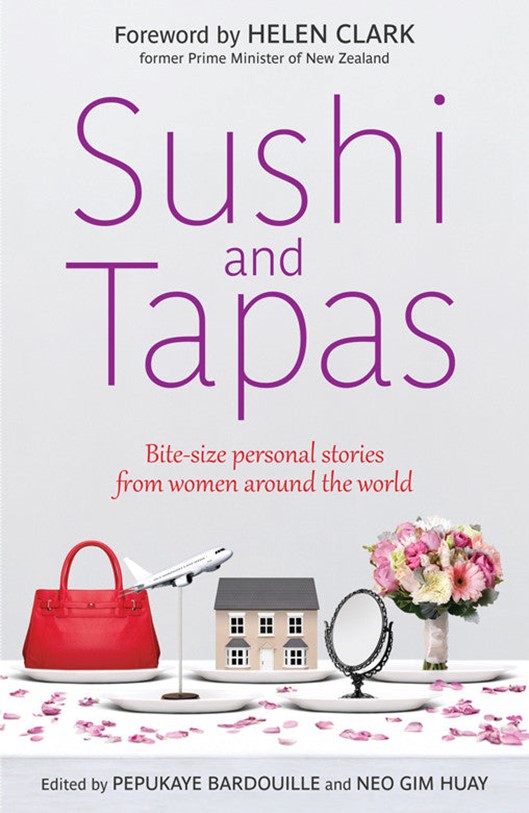Sushi and Tapas: Female Empowerment Through The Telling of Personal Stories
We all travel through different journeys in life based on a myriad of factors, as things like social status, birth place, and life outlook, among many others, can influence and shape our life trajectories in very intricate ways. And while our lives can be so different, we are still able to find common experiences, share laughter and sorrow, and draw inspiration from how others have navigated their own pathways.
Sushi and Tapas is a collection of bite-sized personal stories that encompasses that very idea, but with a focus on women’s lived experiences around the world. Born of an idea by Pepukaye Bardouille and Neo Gim Huay to bring together women from around the world in their twenties to forties to share snippets of their own personal journeys, the book comprises 25 short sharings in the form of stories and poems, which both of them edited and compiled. Stories from everyday women living in countries such as Sweden, South Africa, Japan, the United States (US), Britain, and China are shared honestly and candidly, shedding light on the perspectives of females living in vastly different environments.

Aptly, the book includes a foreword by Helen Clark, former Prime Minister of New Zealand and the second woman to hold that office, as well as the first female head of the United Nations Development Programme (UNDP). She says of the book, “It is transformative in encouraging us to support the empowerment of women everywhere.” In this article, I will share three of the stories that left a lasting impression on me, such that even after I have finished reading the book for some time, I can still remember them vividly.
Embracing your body and rejecting society’s ideal
The first story, “I’m Fat” by Chè Monique Young from the US, has a succinct title charged with meaning. It articulates an extremely common woe of many women—regardless of whether it is physically true. Here, Young shares a quirky fairy tale-like version, edited for length, of how she became fat:
Once upon a time there was a beautiful girl named Donna, [who gave birth to] a small baby, Chè, weighing in at six pounds ten ounces. Donna was so concerned about how little her baby was that she weighed Chè daily on a kitchen scale. She also prayed that the baby would become plump. Miracle of miracles, Chè packed on the pounds. Poor Donna was not happy. While she longed for a chubby baby, she did not want a fat child, especially not a fat daughter. As Chè got older, Donna resorted to bribery, promising her beautiful leather and fur coats if she could just drop the pounds. But that didn’t work, and Chè never slimmed.”
Throughout her schooling years, Young was known as that “fat friend.” Many outfits were too small for her, and boys didn’t seem to like her. “Fat is a very loaded word and fat is what I am…Those things, while people may not like them, are accepted as permanent characteristics of a person. Being fat, however, comes with the expectation that you are unhappy and trying to get rid of it. But I’m tired of being unhappy with half of my physical self and wishing it away,” she writes.
She added that what really helped her become comfortable in her own skin was, ironically, the mirror. At the outset, I felt that was counterintuitive, but as I thought about it more, I started to see it in a different perspective—that spending hours looking at something can also help one to become desensitised to it. Young shared that this has helped her to see beyond her size, which I believe is not the sole thing that defines a person—instead, it is what is within them that matters, rather than what they look like or perceive themselves to look like.
Through this story, Young hopes to inspire more women to learn how to be comfortable in their skin and accept their body for what it is, better. Society today may dictate that the ideal body type is one that is skinny and tall, but everyone is different and we should not force ourselves to conform to that ideal.
Leadership in a male-dominated environment
The next story is “The Tea Lady in the Boardroom” by Zipho Sikhakhane, who shares her experience being the only African American woman in a boardroom meeting dominated by Caucasian men who are much older than her. She was faced with an inner conflict when she was served tea by another black woman; being born and raised in South Africa, she was used to seeing every black woman as her mother and every black man as her father, as is customary in African culture. Hence, she had to resist the urge to get up to help serve the tea out of courtesy.
While most girls in the poor black community in South Africa eventually grow up to be house cleaners, tea ladies, or more ambitious roles like teachers or nurses, she has always been a “societal non-conformer,” and dreamt of getting a seat in boardroom meetings as a businesswoman. Of course, she has had to work much harder at proving her mettle, taking on numerous jobs as a receptionist, tutor, shopkeeper, entertainer, speaker, writer, auditor—all in one year, to get people who can vouch for her proficiency. This allowed her to be able to enter a management consulting career, from which she gained an entry ticket into the boardroom.
Interestingly, she also shares aspects of the culture she is so used to: “never sit on a chair if any man is around” and “[never look] an elderly person in the eye, especially when addressing them…[instead], lower your head, join your hands together, and speak quietly”. In addition, she shares that while meetings can get harsh when people linger and argue about one discussion point, she will never be caught in the heat of those arguments. “Being humble and maintaining composure is part of my cultural blueprint. I am scarcely given occasion to express an opinion in my culture, so whenever I get the chance I use it right.”
She hopes to inspire other young women like her to believe that anything is possible if they work hard enough, to beat the odds in their lives. In addition, I also felt that her story illuminates the good in being strong but remaining humble, and not forgetting our roots and initial dreams.
Learning to accept regrets
The last one is one that I remember most vividly after reading the book, because of the sheer shock factor and detail in which the details of the story were shared. The title is both general but brutally honest: “Suddenly, Without a Map”.
Winnie M. Li, an acclaimed writer and filmmaker from the US state of New Jersey, was hiking leisurely along a forest park in West Belfast when she was stopped by a fifteen-year-old boy who asked her for directions. Little did she know that she would soon be assaulted and raped by him, as they reached an empty, desolate part of the trail. The irony was that she had been invited to Belfast as an honour, to attend a special symposium commemorating the tenth anniversary of the peace process in Northern Ireland.
“One minute, you’re a busy, ambitious film producer with a hyperactive social and work life. The next minute, you’re a rape victim, covered in mud and bruises, the topic of tomorrow’s lurid headline, another unnamed statistic in the crime log,” she chronicles.
In this story, she details dealing with the aftermath and her eventual—though long—process, of healing from self-doubt and finding her way again in life. Sometimes, things do not go according to plan, and there may be regrets along the way, but what we can do is to learn from it and find the strength to move on in life.
Final thoughts
Sushi and Tapas, with all its chronicles of women’s stories around the world, was absolutely heart-warming at times, but also upfront with the struggles people have experienced in each part of the world they are in. But most of all, the book seeks to inspire people through whatever hardships they are facing, and unite them through common experiences that they can relate to.
Overall, I enjoyed learning about and getting a glimpse of cultures and experiences around the world. While the stories are all of women, I am sure it will be an inspiring read for all, regardless of gender, to learn about the experiences of and develop a stronger empathy for others.
By Daphne Yow
